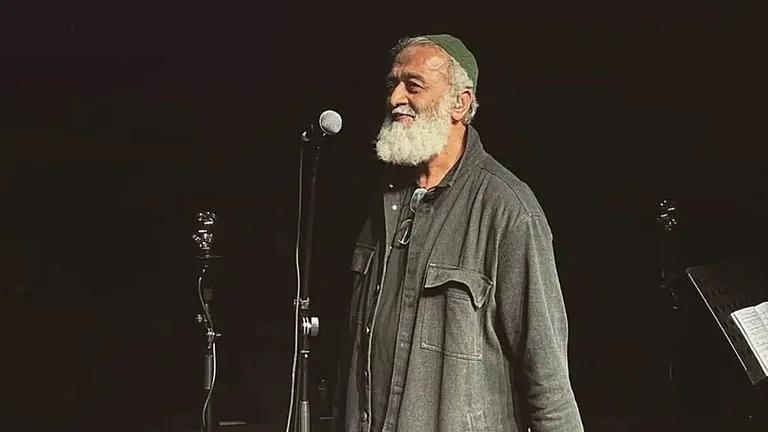MAY 13, 1998. Two American women step into a leading crystal shop at Rue de Rivoli, a prestigious address in posh Paris; ask the owner if they can block his shop for about half-an-hour. Thinking it a joke, he plays along.
Till a dozen police cars surround his shop and cops begin to comb his shop with sensors. Within 10 minutes, Gope Hathiramani is to welcome his most important customer, Hillary Rodham Clinton. In town for a visit, the US First Lady wants to shop for crystalware, chooses Cristal Vendome, Hathiramani's shop. And though she buys goods only worth about $600, the event is displayed in frames all around the shop, etched deeply in Hathiramani's memory.
At first glance, theres nothing remarkable about 59-year-old Hathiramani. A Sindhi businessman, he looks just that. Medium build, rather short and with a round face, it's his incisive brain that makes the man one of the few success stories in the small Indian community in France. His six crystal and souvenir shops have a turnover in excess of 32 million francs; the man himself is worth over 100 million French francs.
Success, however, hasn't come easy. Born in 1940 with the proverbial silver spoon, Hathiramani's family lost its extensive land holdings in Hyderabad, Sindh, seven years later. Partition divided the family - his father left just before Partition to join a multinational company in Algiers, the rest of the family initially settled in Baroda, then moved to Pune. It was in Pune that Hathiramani began his education.
But Hathiramani's father, wanting his family to join him, soon resigned from the MNC job; opened a shop selling toys and gifts, mainly for tourists. The Algerian war of independence in 1954 didn't affect the Indian business community much since it was a neutral party. Our home was in the French quarter and we had to cross the Arab quarter to get to the shop. But there was no problem since the Arabs respected us and the French knew we had nothing to do with the war of independence.
Things changed in 1962, after Algeria won independence. The new government was to impose a total clampdown on imports. My father was quick to realise the danger wed face if imports were banned or curtailed. So I was sent to France, recounts Hathiramani.
The initial three years were a struggle since the French bureaucracy exercised strict control over businesses. But Hathiramani's luck was to turn in 1965, also the year he married a Sindhi girl in Bombay. That March, Hathiramani opened his first shop on Rue de Rivoli, selling leather handbags for the upmarket and touristy clientele the venue attracted. Two more shops in the next four years, also on Rue de Rivoli, and soon Hathiramani was able to invite his family to join him in France.
The mans biggest break was yet to come. I was well settled and doing extremely well. But I wanted to move beyond souvenirs. In 1984 he attended a crystalware exhibition in Paris. That's when I decided crystal will be my next line of business, says Hathiramani.
EXCEPT that the crystalmakers were a closed, exclusive club. There were barely four globally reputed manufacturers. It was almost impossible to become a franchisee for a well-known company. With the high costs involved, few companies wanted to take risks. However, once you got your first franchise, the rest followed. Getting the first one is really tough.
Hathiramani made it easy. When he visited Baccarat, Hathiramani discovered its owner had once been saved during war by a close family relation of his. The bond established, Hathiramani bagged the franchise. Once he had Baccarat, the rest were easy. And though his franchise is limited to Paris, Hathiramani attracts huge business from abroad. I sell at good prices and take good care of my customers. We guarantee safe delivery by mail and replace any breakages, he says. Therefore, he often beats his own suppliers like Baccarat and Lilaque to bag huge individual overseas orders.
However, it's not for the money Hathiramani is in the crystal business. There's more glitter than margins here, says he. I make much more money by selling souvenirs than through crystal. But this business is more prestigious. Evident in the clientele Hathiramani attracts. There are a lot of Indian names too, among them Lata Mangeshkar, the Singhanias, the Poddars. He maintains a special record of purchases by Indian customers, because of their insistence on discounts. They insist they got more discount the last time and want it again. Then I can show them my records, says Hathiramani, as he displays his collection of Indian visiting cards.
Despite spending nearly 50 years outside India, Hathiramani retains his ties. He visits Bombay every year and is a member of the Indian Professionals Association, a body of Indians in Paris, which meets once a month to discuss Indian affairs. When the then prime minister P.V. Narasimha Rao visited Paris, Hathiramani presented a proposal to conscript youth for a year in an army to build infrastructure. Theres been little response on it yet.
Looking back, Hathiramani is philosophical. I wasn't supposed to be a businessman. I was educated and trained to be an electronics engineer. And here I am dealing in souvenirs and crystal. Only because I was the only son and had to carry on my fathers business. It was a push in the right direction, says Hathiramani. The same direction hes now pushing his son in.

























